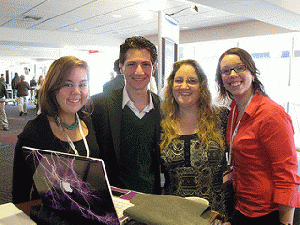Article originally published in the New Jersey Herald
By Robert Weiner, William Klein and Daniel Khan
In 1972, with the Vietnam War raging, voter turnout reached a still unmatched height of 55 percent for 18- to 24-year-olds, and 68 percent for all under age 30.
Newly enfranchised by the 26th Amendment, faced with life-threatening service for the war's unclear mission, youth were able to have to-then unprecedented influence on foreign policy. Lyndon Johnson withdrew from re-election in 1968 because of youth support for war-opposition candidate Sen. Eugene McCarthy.
However, by 2012, 45 percent of 18-29-year-olds voted, down from 51 percent in 2008. The problem was even worse in the 2014 midterm, with only 20 percent of 18-29-year-olds voting nationwide -- the lowest ever in a federal election. New Jersey was lower than the nation at 13 percent.
At the National Press Club in Washington on March 22, Brandon Paulin, America's youngest mayor (19 when elected last year), of Indian Head, Md., and Laquan Austion, CEO of Action for America, announced a plan to recruit millennials to run for office in November. That's a start.
Last summer, the Blair Academy Class of 1965 hosted a forum on contrasts between issues motivating youth in the 1960s and 1970s versus today.
Speakers and the audience asked, can current issues -- jobs, college costs, police killings of minorities, criminal reform for drug crimes, green energy, climate change, income disparity, minimum wage increases, equal pay for women, Internet privacy, Middle East wars, marriage equality, to name several -- add up to enough interest to motivate youth to be active or even vote?
Millennials want more access. The authenticity of Sen. Bernie Sanders' rhetoric is effective among youth (he has won 70 percent of millennials in the primaries), whereas Hillary Clinton is high among women and older voters. Among 18- to 29-year-olds, according to a May 2015 Harvard poll, 55 percent plan to vote Democratic for president in 2016, 40 percent Republican. Polls shift. Youth may or may not stick with Democrats in the general election.
However, Clinton is convinced that in a general election, she can win youth. She told a town hall in February, "I'm going to be for them." In 2012, Democrats crushed Republicans among youth, 67 percent for Obama to 30 percent for Romney.
Because of the weight of college loans and both Democratic candidates' plans to reduce costs, Democrats have an opening. In addition, a January 2016 Rock the Vote poll shows big majorities of millennials favor clean energy, see police violence against African-Americans as a problem, and favor background checks on gun purchases. Gallup Managing Editor Art Swift told us at the National Press Club that two-thirds of millenials favor legalizing marijuana. All these issues trend Democratic.
Yet Republicans have also been reaching out. Donald Trump has been active on social media. Sen. Ted Cruz made a BuzzFeed video auditioning for "The Simpsons" (he did not get on). But if Republicans push youth voter suppression, block reduced college loans, maintain gridlock on infrastructure jobs, and are insensitive to the minimum wage, marriage equality and police brutality, they will continue to draw low numbers.
Questions include, if the nomination goes to Trump, will his group-denigrating messages backfire so young people remain largely Democratic and move against him? If the nominee is Cruz, will his Planned Parenthood anti-abortion position and government shutdowns cost him?
On the Democratic side, if Sanders does not win the nomination, will his voters flock to Clinton? Will Sanders aggressively support her?
Can Clinton continue to assert she will not be bought by big business and be believed by youth? With millennials' increasing influence, politicians need to reach them.
In New Jersey, on June 7, with both parties' decisions still in play, in Democratic and Republican primaries that could be pivotal, as well as in the other remaining primaries and in the general election, youth will have the chance to demonstrate their impact.
Robert Weiner, a Blair Academy 1965 graduate, was the Democratic Party's first National Youth Voter Registration director at the Watergate in 1972, the year 18-year-olds got the vote. He later was a spokesman for the White House and the House Government Operations Committee and for Congressmen John Conyers, Charles Rangel, Claude Pepper, Ed Koch and Sen. Ted Kennedy. William Klein (Blair 2011 "millennial" grad) is from Blairstown and a 2015 Georgetown University graduate. Daniel Khan, from Rockville, Md., is a 2015 American University graduate.
Robert Weiner,
NATIONAL PUBLIC AFFAIRS AND ISSUES STRATEGIST
Bob Weiner, a national issues and public affairs strategist, has been spokesman for and directed the public affairs offices of White House Drug Czar and Four Star General Barry (more...)






